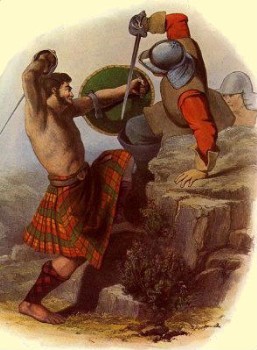
Like most people researching their family history, I too was interested in trying to determine where our family name originated. Unlike the well-researched Highland names, we can't point at a particular clan's village and say, "That's where we came from." Nor can we say, "Our name goes back to 1145 when 5 year-old John MacWhite-un was accidentally forgotten and left at a roadside diner during one of our clan's raids into Perthshire." Instead, we're forced to conduct some research that goes a little outside that of the typical genealogical studies.
I had always assumed that the name Wighton was Scottish in origin. However, I got a rude awakening when a Scottish kilt maker who was helping me find the appropriate kilt for my marriage posed a startling question. She asked, Did you know that your family name comes from England? (See the picture above for the kilt I imagined myself wearing. Well, perhaps it was the body I imagined myself having while I wore the kilt.)
The kilt maker went on to reassure me that the family was still considered to be of Scottish ancestry; it's just our name that originated from England. Nevertheless, the possibility that our Scottish blood could have been tainted with that of the Sassenach led me to think about the consequences if news of our disgrace got out. Our haggis supplier would refuse our orders. Security guards at the Robbie Burns Festival would transport us back to English Canada should we dare to invade their territory. The nearby horticultural center would prosecute us for acquiring heather under false pretenses. My sister would be drummed out of her bagpipe class... something that her classmates would appreciate, but still, it was a horrible thought. Our name? English?
Still, some of what the kilt maker said made sense. Scottish family names are derived from Gaelic place names. i.e. Mac (meaning "son of") Leod (the Gaelic for Lewis). However, our name was clearly Anglo-Saxon and not derived from Gaelic. I had known that the ton ending was Anglo-Saxon and was a reference to a town, but hadn't thought anything about that. A little research was in order. You can read my findings in the Development of the Scottis Language if you want, but it's kind of dry. Or, I'll just summarize what I found, namely: by 1200, Gaelic was the predominant language in southern-Scotland where our family appeared to originate. So, if our family had originated in southern Scotland before 1200, our name wouldn't have been Wighton! That means that our family had to have came from an Anglo-Saxon speaking area after 1200 and, for all intents and purposes, that meant England.
According to the kilt maker,the family name came from Norfolk, one of the ancient Anglian counties on the east coast of England. I found a large scale map and discovered a small town in northern Norfolk named Wighton. Well, that lent a lot of credence to the kilt maker's comment. But, when did we move from England to Scotland? And, Why? Again, the kilt maker had an answer.
In the 18th century, after the Jacobite rebellion, there is evidence that some families from Norfolk were assigned to Meigle by the church to oversee the strict new legislation imposed on the defeated Scots after the battle of Culloden. The Norfolk village of Wighton was an ecclesiastical centre. This, coupled with the fact that Meigle was an ecclesiastical centre and could afford protection for an Englishman living in hostile territory, drew me to the conclusion that at some point your family probably originated from there.
I did some more research and found nothing to support the kilt maker's theory - at least the part that Wightons were sent to Scotland following the Jacobite rebellion. You can read the reasons why I rejected the Ecclesiastical Theory, but if you're just interested in the bottom line, here is it. It didn't happen that way.
Still, there's a certain attractiveness to the theory: our name is Wighton. There's a village in Norfolk named Wighton. We could have came from there. But, two big questions remained. If we didn't emigrate to England in the 18th century, when did we? And why?